Rich's (department store)
Rich's was a department store retail chain, headquartered in Atlanta, Georgia, that operated in the southern U.S. from 1867 until March 6, 2005 when the nameplate was eliminated and replaced by Macy's. Many of the former Rich's stores today form the core of Macy's Central, an Atlanta-based division of Macy's, Inc., which formerly operated as Federated Department Stores, Inc.
 | |
| Department store | |
| Industry | Retail |
| Fate | Merged with Macy's |
| Successor | Macy's |
| Founded | 1867 |
| Defunct | March 6, 2005 |
| Headquarters | Atlanta, Georgia |
| Products | Clothing, footwear, bedding, furniture, jewelry, beauty products, and housewares. |
| Parent | Federated Department Stores, Inc. |
| Website | None |
History
Beginnings
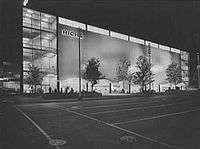


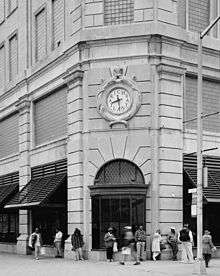


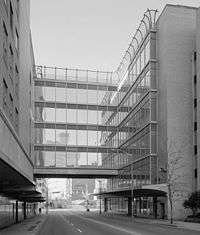

The retailer began in Atlanta as M. Rich & Co., a dry goods store, on 28 May 1867,[1] at 36 Whitehall Street, sole proprietor Mauritius Reich (Anglicized to Morris Rich), a Hungarian Jewish immigrant. It was renamed M. Rich & Bro. in 1877, when he and brother Emanuel formed a partnership. In 1884 when the third brother Daniel was admitted into the partnership, the name became M. Rich & Bros. With business success came a need for expansion, and the store was moved to ever larger locations: in July 1875 to 35 Whitehall; in September 1875 to 43 Whitehall; in October 1875, to 65 Whitehall, at the corner of Hunter (now M.L. King Blvd.); and in September, 1882, to 54-56 Whitehall.[2]
By 1877, Rich's was considered one of the "Big Five" stores in town, in the league of Chamberlain, Boyton, & Co.; Ryan's; Keeley's; and Dougherty's; and later, of the J.M. High Company.[2]
In 1901 Rich's became a true department store when they divided like merchandise into separated sections. The company was incorporated as M. Rich & Bros. Co. In 1906, the adjacent M. Kutz & Co. building at 52 Whitehall was acquired. Both it and 54-56 Whitehall were torn down. Rich's closed its furniture annex and moved its dry goods to that building, until a new building could be built on the site of 52-54-56 Whitehall.[3] In April 1907 the new 'emporium' opened for business.[4] That building is still standing, known as the M. Rich and Brothers and Company Building at its current address of 82 Peachtree St. SE.[5]
In 1924 Rich's moved into its last flagship store at 45 Broad St. SE, between Alabama and Hunter streets, which it would occupy until closing in 1991,[6] That building, a part of the Sam Nunn Atlanta Federal Center complex, was added to eight times during its department store life. It is an example of Palazzo style architecture, a favorite theme associated with department stores constructed in the early twentieth century. The 1946/1948 Store for Homes addition, to the west of the 1924 building across Forsyth Street, was one of Atlanta's earliest examples of International Style architecture.[7]
In 1929, the company was reorganized and the retail portion of the business became, simply, Rich's, while a new, separate venture named M. Rich & Bros. Co. would operate as a real estate company.
Daniel's son Walter Rich succeeded his uncle Morris as Rich's president from 1926 to 1947. The grandson of Morris Rich, Richard H. Rich, took over the store in 1949. Under the leadership of Richard Rich, affectionately known as Dick Rich, Rich's began expansion in the 1950s. Rich's moved outside the Atlanta area for its first new store in 1955 when a store in Knoxville Tennessee was opened. Rich's opened its first suburban store at Lenox Square in 1959, Georgia's first shopping mall. The open-air mall shared space with the other major Atlanta department store, Davison's. That same year Rich's also opened a store at Belvedere Plaza Shopping Center, a large two-level strip mall in Belvedere Park near Decatur and more recently famous for its "wigs and beepers" store. Rich's sold off its Knoxville store to Miller's when profits fell off, and refocused on its Georgia stores.
Holiday traditions
Two holiday traditions associated with Rich's were the Great Tree and the Pink Pig. Starting in 1948, the Great Tree, conceptualized by executive Frank Pallotta, was a massive pine, set on top of the multi-level glass "Crystal Bridge" connecting the main downtown Atlanta store which housed the "Store for Fashion" with the "Store For Homes" across Forsyth Street. After the closure of the downtown store in 1991, the Great Tree, and the annual Thanksgiving evening tree-lighting festivities, moved to nearby Underground Atlanta. After several years of poor attendance, the Tree was moved to the top of the Men's Store at the Lenox Square location. This placed the tree on the corner of the mall closest to the prominent intersection of Peachtree and Lenox Roads. The tree lighting ceremony traditionally features country and pop music performers from Georgia, such as Kenny Rogers, several choirs from local churches, and a rendition of "O Holy Night" with the tree being lit by a child during the high note of the line "O night divine."
The Pink Pig (installed in 1956 and known originally as The Snowball Express) was a child-scaled monorail that hung from the toy department's ceiling in the downtown Store for Fashion. In 1965, it was moved to the roof of the store where a second monorail was added and the duo became known as the Pink Pig Flyers (receiving the names of Priscilla and Percival in the 1970s). The front car of the trains had pig faces and the last cars had curly tails. For many years after the closure of the downtown store, the Pink Pigs were set up at the Festival of Trees at the Georgia World Congress Center. Macy's Lenox Square continues the holiday tradition using a redesigned child-sized train (rather than a monorail) set up on the top level of the Lenox Road Parking Deck. The train ride takes riders through a storybook tale of Priscilla Pig. The original Pink Pig Flyers monorail cars are now at the Atlanta History Center where they are occasionally displayed.
Dear Store
In 1967, Atlanta Constitution columnist Celestine Sibley wrote Dear Store: An Affectionate Portrait of Rich's. In it, she mentioned notable acts by Rich's staff and management, including the cashing of scrip payments made by the City of Atlanta to its schoolteachers during a financial crisis, accepting returns of worn nylons during World War II shortages, and the efforts of their personal shopper service, "Penelope Penn," to find the perfect gift for thousands of customers who wrote to them. The title of the book comes from a letter in which a child offers to trade his younger sister for a toy that he wants.
The book also relates the story of Coretta Scott King, who chose to shop at Rich's for a coat when her husband, Martin Luther King, Jr. was awarded the Nobel Peace Prize. The salesperson advised Mrs. King not to buy a fur, because it would compare unfavorably to the extravagant furs worn by the Scandinavian attendees, instead selecting a conservative cloth coat for the occasion.
Expansion
Rich's most aggressive expansion was during the 1960s and 1970s. Four more stores opened in the Atlanta area in the 1960s, two of those enormous three-story full-line stores. While this expansion resulted in continued success of the chain, it chipped away at the business of the downtown store. By this time, Rich's was the leading regional department store in the country, though it remained largely unknown by the general public outside of Georgia. This would soon change, however.
Throughout the 1970s, four more Rich's locations opened in Georgia including one in Augusta, the first in the state outside of Atlanta. Rich's also began an aggressive expansion with stores in Alabama and South Carolina. Also, there were plans much later in the early 1990s to expand Rich's into Charlotte, but these were scrapped. Of all the stores out of state, stores opened in Greenville, Columbia and Birmingham (with two, adding a third in 1986) created stiffer competition in those cities against regional chains Pizitz, Loveman's and Parisian.
Federated
The sale to Federated in 1976 ended over 100 years of ownership by the Rich family. Aside from the Great Tree, most of the traditions of Rich's and the departments (including the bakery) were all stripped away by the early 1990s. Loyalty to the chain, however, remained very strong even after the downtown flagship store was closed in 1991.
In 1994, the parent company of Rich's bought out Macy's, which was historically Atlanta's rival chain under the Davison's banner. The following year, Rich's was merged with Lazarus in the midwest and Goldsmith's in Memphis. Through the merged division, the chain grew in a corporate sense as it was operated out of Atlanta, but the Lazarus and Goldsmith's stores continued to operate under their regional names. The merger with Goldsmith's occurred in 1988 and Lazarus in 1995. Lazarus was one of Federated's founding store chains.
Closures of Davison's/Macy's stores

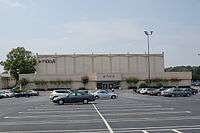

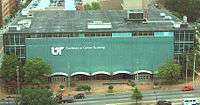
When Rich's and Macy's both were owned by the same company, this resulted in the overlapping of the two chains all selling the same products. Initially, both stores remained open with Macy's losing its higher-end merchandise and becoming distinctly downmarket when compared with Rich's. The decision was made in 2003 to close all of the former Davison's/Macy's stores in Atlanta (no new Macy's stores had been built in Atlanta since Town Center at Cobb in 1986) and co-brand Rich's as Rich's-Macy's. The only original Macy's/Davison's store to remain open is Northlake Mall - originally the downtown Atlanta store was to remain open, but a sudden change of direction by Macy's corporate closed the last major retailer in downtown Atlanta. The cobranded name change was intended to slowly phase out the chain instead of a sudden change so as to reduce the backlash over the elimination of an Atlanta institution that was one of the institutions that defined the city, similar to Marshall Field's in Chicago. As Macy's was a well-known part of the Atlanta retail landscape since its purchase of Davison's in the 1920s, loyal Rich's customers who defected to other stores were replaced by longtime Macy's/Davison's customers.
The same year that Rich's and Macy's merged, the downtown Macy's (Davison's flagship store) was closed. Also in the merger, the Lenox Square Macy's and Perimeter Mall Macy's (both former Davison's) reopened as Bloomingdale's. The Perimeter Mall location closed in March 2012, reopening as a branch of the Von Maur chain. The Lenox Square location is still open as of 2020. The rest closed except for the Town Center Mall store, the middle floor of which is currently a Macy's Furniture store; the upper floor is a Macy's Furniture Clearance Center; the lower floor is currently Macy's Men's Store. The following year, when the Cobb Center Mall store closed, the furniture clearance center was relocated there.
In 1995, the downtown Atlanta Rich's 1924 store became part of the Sam Nunn Atlanta Federal Center. It is known as "The 1924 Building". The Store For Homes, the "Crystal Bridge," and a concrete parking deck with a locally-famous spiral down ramp were razed, and replaced by a high-rise, a small building containing a McDonald's and other retail space, and a more substantial connector between the high-rise and the original 1924 Rich's building. The top floor of the 1924 building, a later addition of concrete and glass block not in the style of the original, was removed. An addition in the style of the original was built on the corner of Forsyth and Old Alabama Streets, which had been a park and previously the location of the offices of The Atlanta Journal before its merger with The Atlanta Constitution.
Name changes
After 138 years, Rich's (later as Rich's-Macy's) brand disappeared on March 6, 2005. Other historical retail nameplates "Goldsmith-Macy's" and "Lazarus-Macy's" were eliminated, with the stores rebranded as Macy's. Atlanta-area stores are in the Macy's Southeast Region with Atlanta East & Atlanta West Districts.[8] A signature event of the store, Rich's Great Tree, continues as an annual Thanksgiving event in Atlanta at the Lenox location as Macy's Great Tree. Some buildings which once housed Rich's stores continue to operate under the Macy's banner. Some former Rich's buildings are no longer in use, as the malls which housed them have been shuttered. The Richway discount store chain, founded in 1968, was sold, and in 1988 became a part of Target Stores.
The Rich Family
Morris, Emanuel, and Daniel Rich are buried at Oakland Cemetery in east Atlanta. Walter Rich and Dick Rich are buried at Westview Cemetery in southwest Atlanta. Many of the Rich family descendants reside in the Atlanta area.
References
- http://www.ourgeorgiahistory.com/year/1867
- Rich's: A Southern Institution, Jeff Clemmons, pp. 26, 30-31
- "Rebuilding sale of furniture, advertisement by M. Rich & Bros. Co., Atlanta Constitution, April 6, 1906, p.4
- "M. Rich Brothers and Company complete great department store", '"Atlanta Constitution, April 28, 1907 Archived July 16, 2014, at the Wayback Machine
- "M. Rich and Brothers and Company Building", City of Atlanta Urban Design Commission
- "Rich's Plans To Close Its Main Store", Isadore Barmash, New York Times, April 18, 1991
- Library of Congress
- "Maps by Market" Macy's, Inc.
Further reading
- Clemmons, Jeff (2012). Rich's: A Southern Institution. The History Press. ISBN 978-1609491918.
- Baker, Henry Givens (1953). Rich's of Atlanta; the story of a store since 1867. (1953 store history; full book available online)
External links
| Wikimedia Commons has media related to Rich's Department Store, Downtown Atlanta. |